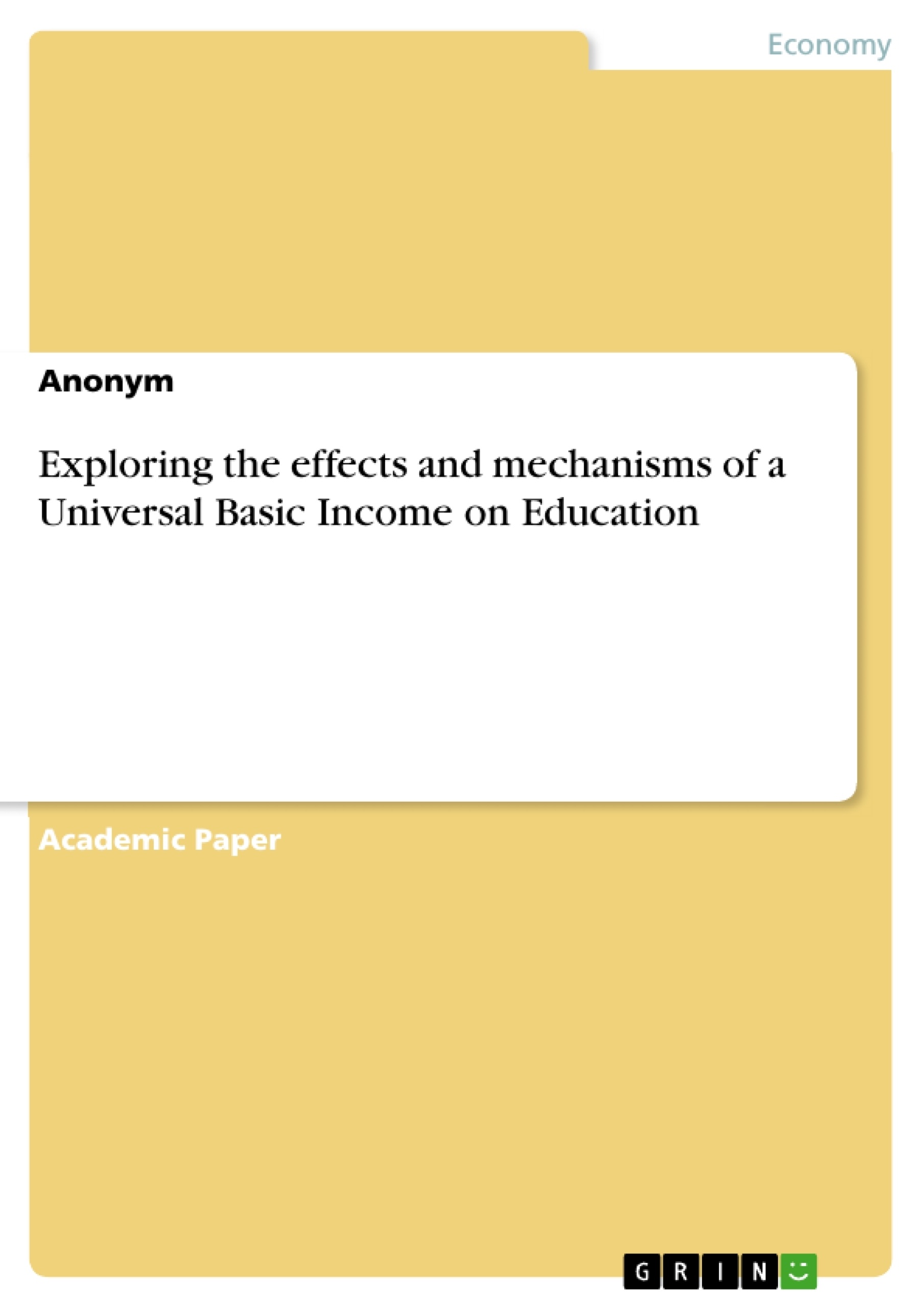This paper aims to find out about the effects of a Universal Basic Income on education. At first, the concept of the Universal Basic Income will be explained and it will be put into a global context. Further, its effect on education will be analyzed using various studies conducted over the last decades, to estimate the short-term impacts a UBI would have on education. In order to also go into detail on long-term effects, the latter analysis will be complemented with a model by Daruich & Fernández (2020). This will show that while short-term effects of a Universal Basic Income might seem favorable when viewing a UBI policy over a longer time frame effects such as a general equilibrium and intergenerational linkages come into play. This leads to the conclusion that while a Universal basic income might seem to increase education standards at first glance, over the long-term this would most likely not be the case, even considering extreme scenarios, such as massive job losses due to automation.
Inhaltsverzeichnis (Table of Contents)
- Introduction
- The History and Concept of a Universal Basic Income
- The Importance of UBI
- Education
- Outline of Studies
- Study Results
- Methods of Effect
- Factors that influence UBI
- Is Income spent the right Way?
- Intergenerational Linkages
- Long Term Effects
- Covid-19 and Automation Effects on a Universal Basic Income
Zielsetzung und Themenschwerpunkte (Objectives and Key Themes)
This paper investigates the potential effects of a Universal Basic Income (UBI) on education. The research aims to analyze how a UBI policy could influence both short-term and long-term educational outcomes, considering various factors such as economic changes and intergenerational impacts.
- The concept of Universal Basic Income (UBI)
- Short-term and long-term effects of UBI on education
- Factors influencing the impact of UBI on education, including job automation and economic changes
- Intergenerational linkages and the long-term implications of UBI on educational attainment
- The potential of UBI to enhance education standards and its broader societal implications
Zusammenfassung der Kapitel (Chapter Summaries)
- Introduction: This chapter provides an overview of the paper's objectives and research questions. It sets the stage for the exploration of the potential effects of a UBI on education.
- The History and Concept of a Universal Basic Income: This chapter examines the historical development and theoretical foundations of the Universal Basic Income (UBI) concept. It explores various perspectives and arguments surrounding the implementation of UBI policies.
- The Importance of UBI: This chapter delves into the potential benefits and societal implications of implementing a UBI. It discusses potential positive effects on poverty reduction, economic security, and social well-being.
- Education: This chapter focuses on the effects of a UBI on education. It analyzes various studies that have investigated the short-term impacts of UBI on educational participation and attainment. This chapter also examines the long-term implications of UBI on education through a model developed by Daruich & Fernández (2020). It explores how a UBI might influence intergenerational linkages and overall educational standards over time.
- Covid-19 and Automation Effects on a Universal Basic Income: This chapter explores the potential role of a UBI in mitigating the economic and social consequences of the Covid-19 pandemic and automation-driven job displacement. It examines how UBI could provide economic support and facilitate adaptation to changing labor market conditions.
Schlüsselwörter (Keywords)
The primary focus of this paper lies on the concept of a Universal Basic Income (UBI) and its impact on education. This includes exploring the short-term and long-term effects of UBI on educational participation, attainment, and intergenerational linkages. The paper also considers the broader implications of UBI in the context of automation, economic change, and the Covid-19 pandemic. Key terms include UBI, education, automation, economic growth, poverty reduction, social well-being, and intergenerational equity.
Frequently Asked Questions
What is the impact of Universal Basic Income (UBI) on education?
The paper finds that while short-term effects may seem favorable for education standards, long-term impacts might be less positive due to general equilibrium and intergenerational linkages.
How does UBI relate to job automation?
The study considers scenarios where massive job losses occur due to automation and examines whether UBI could mitigate these effects by supporting educational adaptation.
What model is used to analyze long-term effects?
The analysis is complemented by a model from Daruich & Fernández (2020) to detail long-term educational outcomes and intergenerational linkages.
Does UBI lead to better spending on education?
The research explores factors such as whether the additional income is actually spent on educational purposes and how this influences overall attainment.
What role did Covid-19 play in the UBI discussion?
The paper includes a chapter on how the pandemic and subsequent economic changes have influenced the debate and potential implementation of UBI policies.
What is the final conclusion regarding education standards?
The paper concludes that a UBI would likely not increase education standards over the long term, even when accounting for extreme future labor market shifts.
- Quote paper
- Anonym (Author), 2022, Exploring the effects and mechanisms of a Universal Basic Income on Education, Munich, GRIN Verlag, https://www.grin.com/document/1242792



